Dennis Langlais
BMX Freestyle Extreme Sports Athlete
DEDICATION, DEVOTION, GUIDANCE, EXCELLENCE A TRAILBLAZER ON WHEELS CHANGING LIVES

In the formative years of the 1980s, the northeastern quadrant of the United States remained largely unnoticed in the BMX Freestyle arena. BMX Racing was a familiar sight, yet Freestyle was an anomaly. However, it was under Dennis Langlais' auspices and pioneering efforts that the younger generation began to embrace the sport. In Massachusetts, Dennis approached an educator from his elementary institution, seeking guidance in nurturing the amateur freestyle team he had co founded with his colleague, Darren Prescott. This initiative precipitated the inception of the most renowned professional freestyle team in the Northeast, garnering global acclamation. Indeed, Dennis acted as the catalyst, revitalizing the northeastern sector by amplifying freestyle events, cultivating teams, and consequently, magnifying the sales of freestyle bicycles.
Dennis orchestrated innumerable school seminars
Dennis' presence was instrumental in bridging the AFA with Ron Stebenne, which subsequently collaborated with Bob Morales, introducing AFA events to the northeast. This integration had a profound impact, transforming the lives of countless youths and their families. Without Dennis's magnetic influence and unparalleled prowess, major corporate entities might have remained oblivious to the BMX freestyle potential in the northeast. Dennis' charisma and expertise magnetized brands, drawing them closer to the sport. Additionally, through his innovative online enterprise, Dennis orchestrated innumerable school seminars, promulgating essential messages on bike safety and helmet adherence. One can authenticate that his campaigns have indeed played a pivotal role in averting a potential fatality (documented proof available). It's incalculable to gauge the number of youths who might have internalized these safety precepts, circumventing grave mishaps.
Had it not been for Dennis's trailblazing initiatives, the iconic Mountain Dew/GT Team might never have come to fruition. The subsequent successes and career trajectories of its members would have remained a mere conjecture.
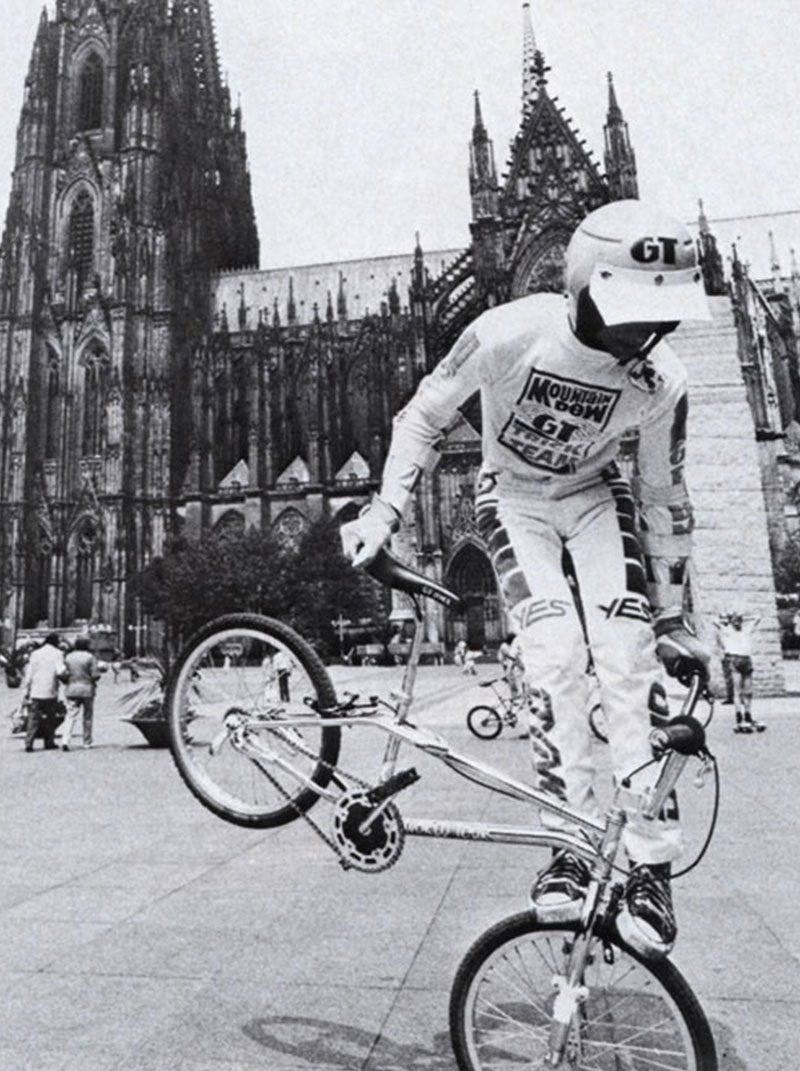
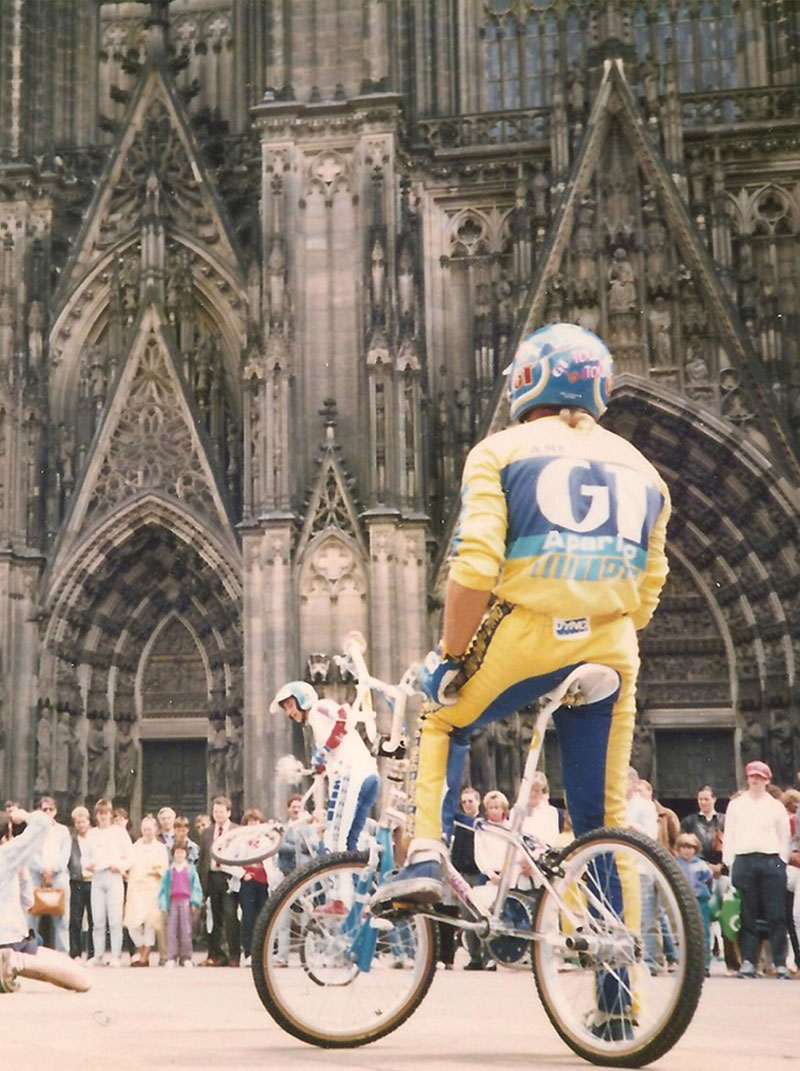
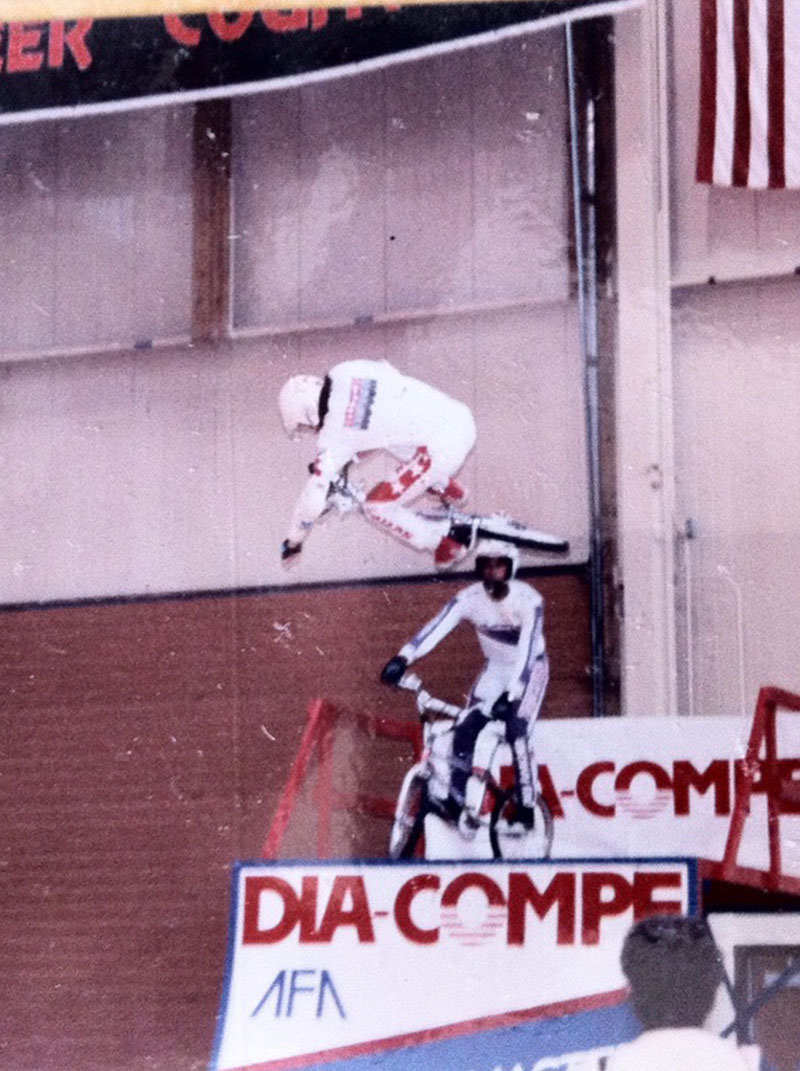
Collaborating with numerous BMX freestyle enthusiasts
Dennis, in his esteemed capacity, has been an exemplary advocate for the myriad brands that have endorsed him, showcasing his impeccable skills on a global platform. His contribution has undoubtedly bolstered the market presence of these brands. Furthermore, his altruistic nature is evident in his continuous endeavors to uplift others, both personally and professionally, even collaborating with numerous BMX freestyle enthusiasts. One of Dennis's commendable feats includes the architecting of a multifaceted website tailored to automate the intricate operations of his school assembly enterprise. This technological innovation not only streamlined school seminar management but also augmented the outreach of BMX shows, brand awareness, and life saving messages.
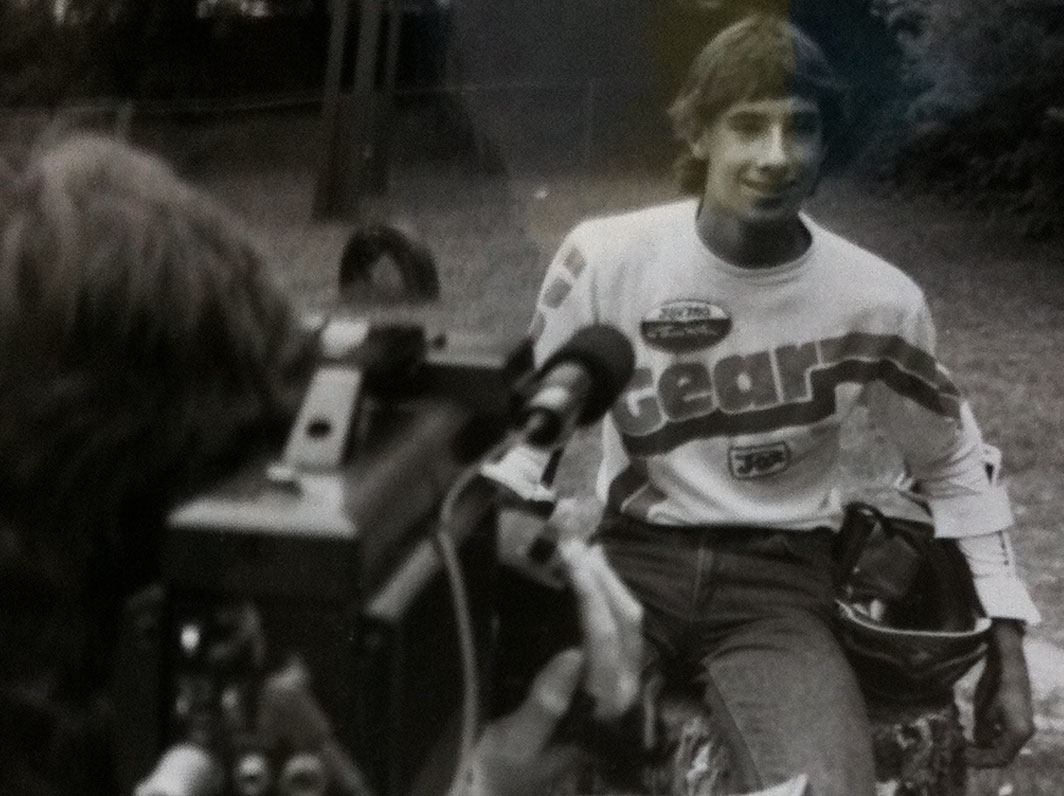
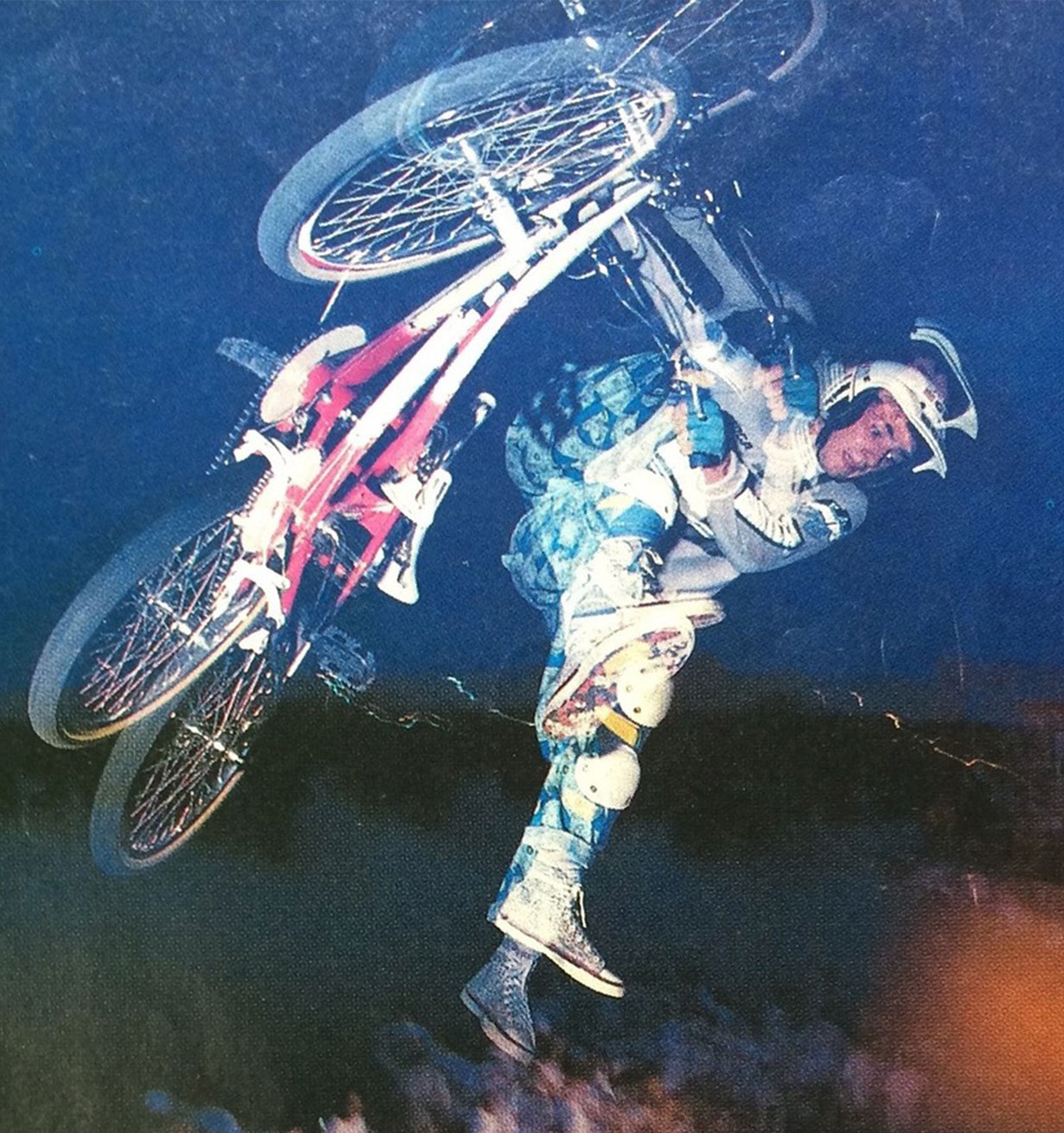
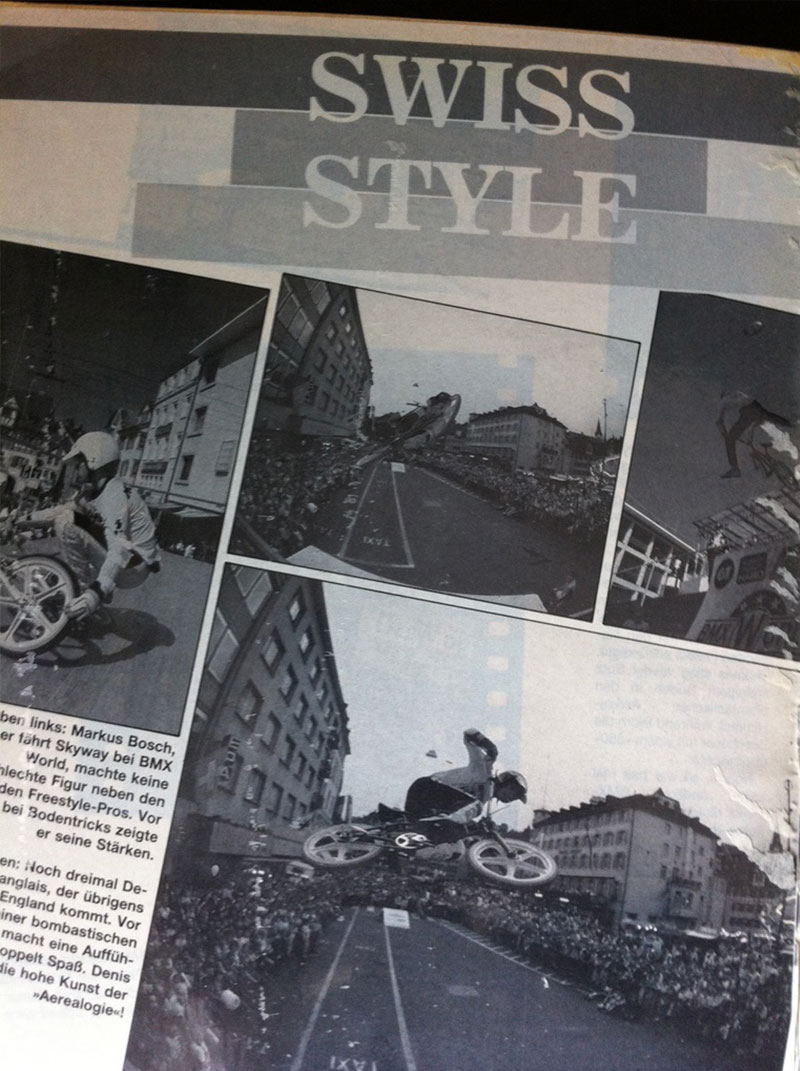
East Coast Wheels Team BMX Team
In the nascent 1980s, a young Dennis Langlais, barely 11, showcased his passion for BMX, diligently practicing his craft even amid the harshest winter conditions. Such dedication left an indelible impression on the local youths who comprehended his aspirations. To many adults, he was a mere youngster indulging in ephemeral hobbies. However, Dennis's perseverance culminated in procuring a bike shop endorsement, a precursor to greater opportunities. Dennis and Darren Prescott's nascent 'East Coast Wheels Team' required assistance in securing sponsorships. Their relentless pursuit led them to potential sponsors, bridging the chasm between the seemingly insurmountable western BMX powerhouses and the eastern teams.

An announcement of the 'GT BMX Freestyle Team' from California
An announcement of the 'GT BMX Freestyle Team' from California performing in Connecticut ignited excitement in Dennis and his team. This event serendipitously sowed the seeds for the Mountain Dew GT Trick Team's inception. Over the subsequent years, the team's dedication began bearing fruit, challenging even the best west coast riders. Their endeavors drew them closer to significant entities like the AFA, and with time, television promoters took notice. Dennis's journey took him across continents, from Europe to America, rubbing shoulders with notable names like Matt Hoffman and David Mira, traveling with them at times. Later, Dennis associated with the Hutch team and subsequently ventured into entrepreneurial endeavors, forming his own BMX freestyle venture.
By 1991, Dennis's performance company was targeting schools across San Diego, expanding its horizon
With an impeccable reputation. His relentless pursuit of excellence led to the establishment of a sophisticated website, a testament to his multifaceted talents. Dennis was admired by those local youth that understood what he was trying to do. To most adults, he was a just another kid doing kid stuff. Most thought it was just a phase, and the bike would soon be put away to be replaced by a guitar or baseball bat. Though Dennis and his friends had outside interests, the BMX bike became part of them, an extension of their feet and their identity. Dennis's persistence eventually paid off as he landed a bike shop sponsorship that would eventually lead to bigger and better things. The little "East Coast Wheels Team" Dennis and his friend Darren Prescott started needed some help. Dennis asked a teacher in his school for help writing to potential sponsors. This effort paid off with som small sponsorship that eventually led to larger ones. However, the west coast BMX freestyle teams seemed untouchable and too good for eastern teams to catch up in sponsorships, riding ability, and fame. That did not deter them. They just worked harder. Dennis and his team were fans of the "GT BMX Freestyle Team" from California. Haro and GT were the best and most popular bikes for racing and began gaining in popularity with trick bikes or Freestyle Bikes. When it was advertised that the GT Team and their pro bikers were going to do a show in Connecticut, Dennis's East Coast Wheels Team just had to go. Ron Wilkerson and Eddie Fiola were the pro bikers at the event and favorites of Dennis and the team. That show created a chance of a lifetime for Dennis, the team, and Ron Stebenne (team manager) who worked out a deal with GT for a sponsorship. Freestyle Promotions International was born and so was the Mountain Dew GT Trick Team. All the hard work of the past couple of years began to really pay off. The Mountain Dew Team was now ready to take on the west coast riders. Dennis and the team with some parents packed their bags and entered the American Freestyle Association's contest at Venice Beach California. Bob Morales, a designer for GT (DYNOo) and the owner of the contest series for the AFA, became friends with Ron Stebenne, Dennis, and the team. That friendship led to numerous contests taking place up and down the east coast under the AFA sanction body umbrella in conjunction with the Boy Scouts of America. The team learned a lot from the contest and made great connections with people that would continue to be part of the team's life for years to come. All this activity attracted promoters for TV shows. Later, Dennis went to Europe as guests of sponsors for TV shows in France and England. Dennis was catching up with Matt Hoffman, David Mira, and other big names at that time, often beating them in contests. Dennis and other team members were now becoming the celebrities in their own right, enjoying the best the sport had to offer. Dennis began more tours to Europe, doing more TV stories and interviews, and gained more sponsors. Dennis later joined the Hutch team in the late 80's until the company folded. The original Mt. Dew/GT equipment was purchased by Chris Lashua and the shows with Dennis and others went on under Chris's management and new company name, "Freestyle Performance." Meanwhile, Dennis was making his own way in the BMX world by connecting with California bike companies and pros. His connections led to friends on Diamondback Bicycles. Dennis was a sleeping giant as a businessman. However, he was about to make his move in the industry.



The Move To San Diego California
Dennis decided he wanted to be closer to the industry as well and moved out to San Diego to live by the famous "Enchanted Ramp"? owned by Ron Wilkerson of Haro and his Two Hip brand. Dennis paid his dues at Wilkerson's by sleeping on the floor with a number of other BMX hopefuls sharing floor space in the small ranch by the 5 freeway. Dennis stay in California was short. However, it gave him a chance to see what was around for him. Not seeing anything right away, he moved back to Boston and lived with some BMX buddies from the old days. Dennis soon returned to California with friends from the earlier East Coast Wheels days. Now Dennis had a team to begin a new enterprise, his own BMX freestyle program. The year was 1991 when Dennis started his performing company. His target was the public schools in San Diego and beyond. Dennis's performance and assembly company's influence grew in southern California as his reputation for professionalism grew. Knowing many riders all over the country, Dennis began to pull in his buddies in different states and employed them to do shows in other states. He held them to the same high standards of excellence he set for himself with his own performances. If they didn't hold up to his standards, he let them go. Some of the groups spun off to do their own shows in competition with Dennis. However, few could match his level of excellence. Some years passed and Dennis created quite a name for himself and his company. Dennis learned to juggle schedules, handle performer personalities, and the politics of working for schools and school personnel. This is all quite an accomplishment in itself. Another outstanding accomplishment was Dennis's creation of a multifunctional website that quite literally automatically ran the school assembly business. This very complex site and intricate platform creation could never have been expected of a kid riding a BMX bike. Dennis is full of surprises and continues to be a change agent in the world of BMX freestyle, tech, and promotions to this day.